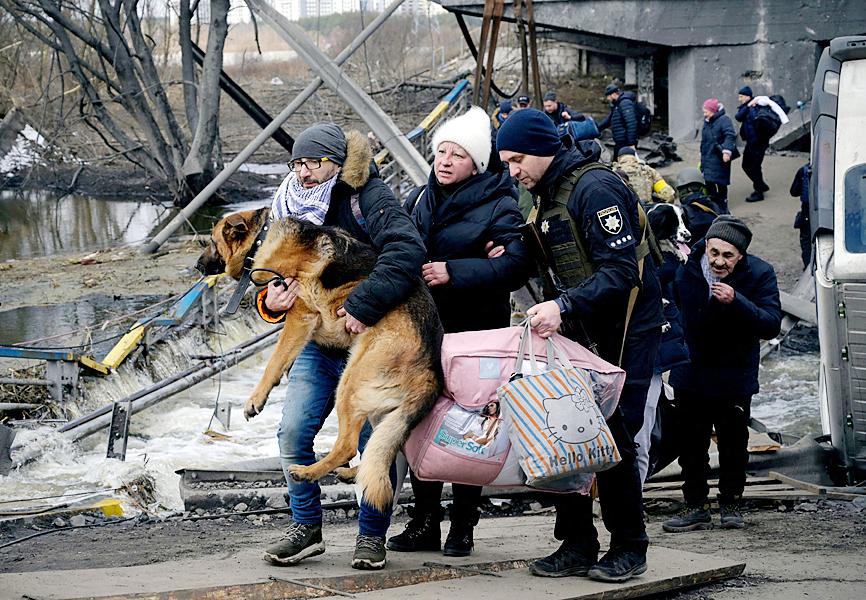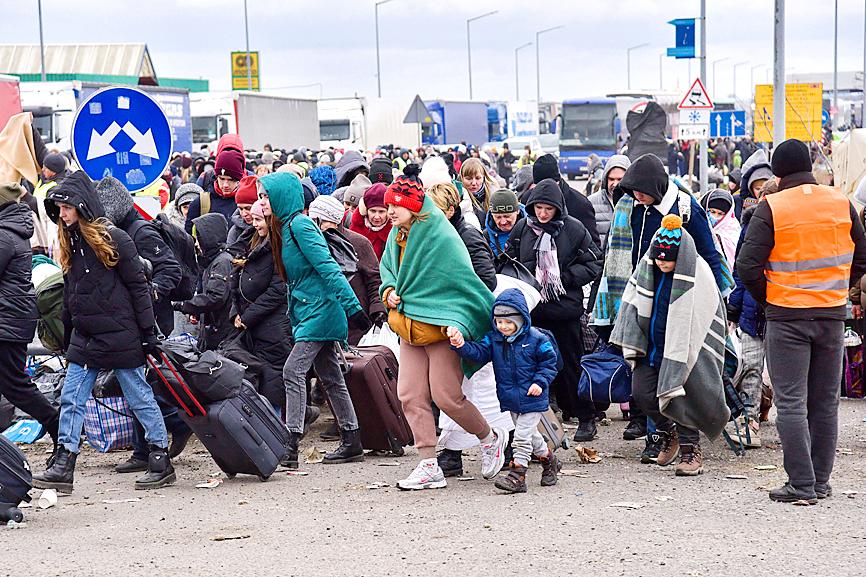The US on Tuesday announced a ban on imports of Russian oil, firing one of its biggest economic weapons against Moscow, which yesterday accused Washington of declaring an economic war on Russia that was sowing mayhem in the energy markets.
US President Joe Biden said the US oil embargo on Russia would cut “the main artery” of Moscow’s economy, and vowed that Russia’s invasion of Ukraine would “never be a victory” for Russian President Vladimir Putin.
Britain said it would join the US in phasing out Russian oil by the end of the year, while oil giants BP and Shell announced an immediate halt to Russian oil and gas purchases.

Photo: Reuters
The EU also said it would slash gas imports by two-third.
Kremlin spokesman Dmitry Peskov cast the West’s sanctions as “hostile bacchanalia” that had roiled global markets and warned that it was unclear how far turbulence on global energy markets would go.
Russia might rethink its energy-supply commitments in light of the sanctions, he told reporters.

Photo: EPA-EFE
“European leaders unanimously recognize that Russia is fulfilling all its contractual obligations without interruption and in full,” Peskov said. “But you see the hostile bacchanalia that the countries of the ‘collective West’ have caused of course makes the situation very difficult and forces us to seriously think about this.”
Meanwhile, renewed efforts to evacuate civilians from besieged and bombarded Ukrainian cities were under way yesterday, as authorities seek to rescue people from increasingly dire conditions. Days of shelling have largely cut residents of the southern city of Mariupol off from the outside world, and forced them to scavenge for food and water.
Authorities announced another ceasefire to allow civilians to escape from Mariupol, Sumy in the northeast, Enerhodar in the south, Volnovakha in the southeast, Izyum in the east and several towns in the region around the capital, Kyiv.

Photo: EPA-EFE
Previous attempts to establish safe evacuation corridors have largely failed due to attacks by Russian forces, and there were few details on yesterday’s new effort.
However, air raid sirens repeatedly went off in the capital and explosions could be heard there, raising tensions in the rattled city.
Mariupol, where nearly half of the population of 430,000 is hoping to flee, has been surrounded by Russian forces for days. Corpses lie in the streets, and people break into stores in search of food and melt snow for water. Thousands huddle in basements, sheltering from the Russian shells pounding the strategic port on the Azov Sea.
Thousands of people are thought to have been killed, both civilians and soldiers, in two weeks of fighting since Putin’s forces invaded.
The UN estimates that more than 2 million people have fled the country, the biggest exodus of refugees in Europe since the end of World War II.
The crisis is likely to get worse as Russian forces step up their bombardment of cities throughout the country in response to stronger-than-expected resistance from Ukrainian forces.
Russian losses have been “far in excess” of what Putin and his generals expected, CIA Director William Burns told a US congressional meeting on Tuesday.
An intensified push by Russian forces could mean “an ugly next few weeks,” he said, adding that Putin was likely to “grind down the Ukrainian military with no regard for civilian casualties.”
The British Ministry of Defence yesterday said that fighting continued northwest of Kyiv. The cities of Kharkiv, Chernihiv, Sumy and Mariupol were being heavily shelled and remained encircled by Russian forces.
Russian forces were placing military equipment on farms and amid residential buildings in the northern city of Chernihiv, Ukraine’s general staff said.
In the south, Russians dressed in civilian clothes were advancing on the city of Mykolaiv, a Black Sea shipbuilding center of half a million people, it said.
Meanwhile, the Ukrainian military was building up defenses in cities in the north, south and east, and forces around Kyiv are “holding the line” against the Russian offensive.
Ukraine’s state-run nuclear company Energoatom yesterday said that radioactive substances could be released from the Chernobyl nuclear power plant because it cannot cool spent nuclear fuel after its power connection was severed.
It said that fighting made it impossible to immediately repair the high-voltage power line to the plant, which was captured by Russian forces.
Energoatom said there were about 20,000 spent fuel assemblies at Chernobyl that could not be kept cool amid a power outage.
Their warming could lead to “the release of radioactive substances into the environment. The radioactive cloud could be carried by wind to other regions of Ukraine, Belarus, Russia, and Europe,” it said in a statement.

EUROPEAN TARGETS: The planned Munich center would support TSMC’s European customers to design high-performance, energy-efficient chips, an executive said Taiwan Semiconductor Manufacturing Co (TSMC, 台積電), the world’s largest contract chipmaker, yesterday said that it plans to launch a new research-and-development (R&D) center in Munich, Germany, next quarter to assist customers with chip design. TSMC Europe president Paul de Bot made the announcement during a technology symposium in Amsterdam on Tuesday, the chipmaker said. The new Munich center would be the firm’s first chip designing center in Europe, it said. The chipmaker has set up a major R&D center at its base of operations in Hsinchu and plans to create a new one in the US to provide services for major US customers,

The Ministry of Transportation and Communications yesterday said that it would redesign the written portion of the driver’s license exam to make it more rigorous. “We hope that the exam can assess drivers’ understanding of traffic rules, particularly those who take the driver’s license test for the first time. In the past, drivers only needed to cram a book of test questions to pass the written exam,” Minister of Transportation and Communications Chen Shih-kai (陳世凱) told a news conference at the Taoyuan Motor Vehicle Office. “In the future, they would not be able to pass the test unless they study traffic regulations

‘A SURVIVAL QUESTION’: US officials have been urging the opposition KMT and TPP not to block defense spending, especially the special defense budget, an official said The US plans to ramp up weapons sales to Taiwan to a level exceeding US President Donald Trump’s first term as part of an effort to deter China as it intensifies military pressure on the nation, two US officials said on condition of anonymity. If US arms sales do accelerate, it could ease worries about the extent of Trump’s commitment to Taiwan. It would also add new friction to the tense US-China relationship. The officials said they expect US approvals for weapons sales to Taiwan over the next four years to surpass those in Trump’s first term, with one of them saying

‘COMING MENACINGLY’: The CDC advised wearing a mask when visiting hospitals or long-term care centers, on public transportation and in crowded indoor venues Hospital visits for COVID-19 last week increased by 113 percent to 41,402, the Centers for Disease Control (CDC) said yesterday, as it encouraged people to wear a mask in three public settings to prevent infection. CDC Epidemic Intelligence Center Deputy Director Lee Chia-lin (李佳琳) said weekly hospital visits for COVID-19 have been increasing for seven consecutive weeks, and 102 severe COVID-19 cases and 19 deaths were confirmed last week, both the highest weekly numbers this year. CDC physician Lee Tsung-han (李宗翰) said the youngest person hospitalized due to the disease this year was reported last week, a one-month-old baby, who does not